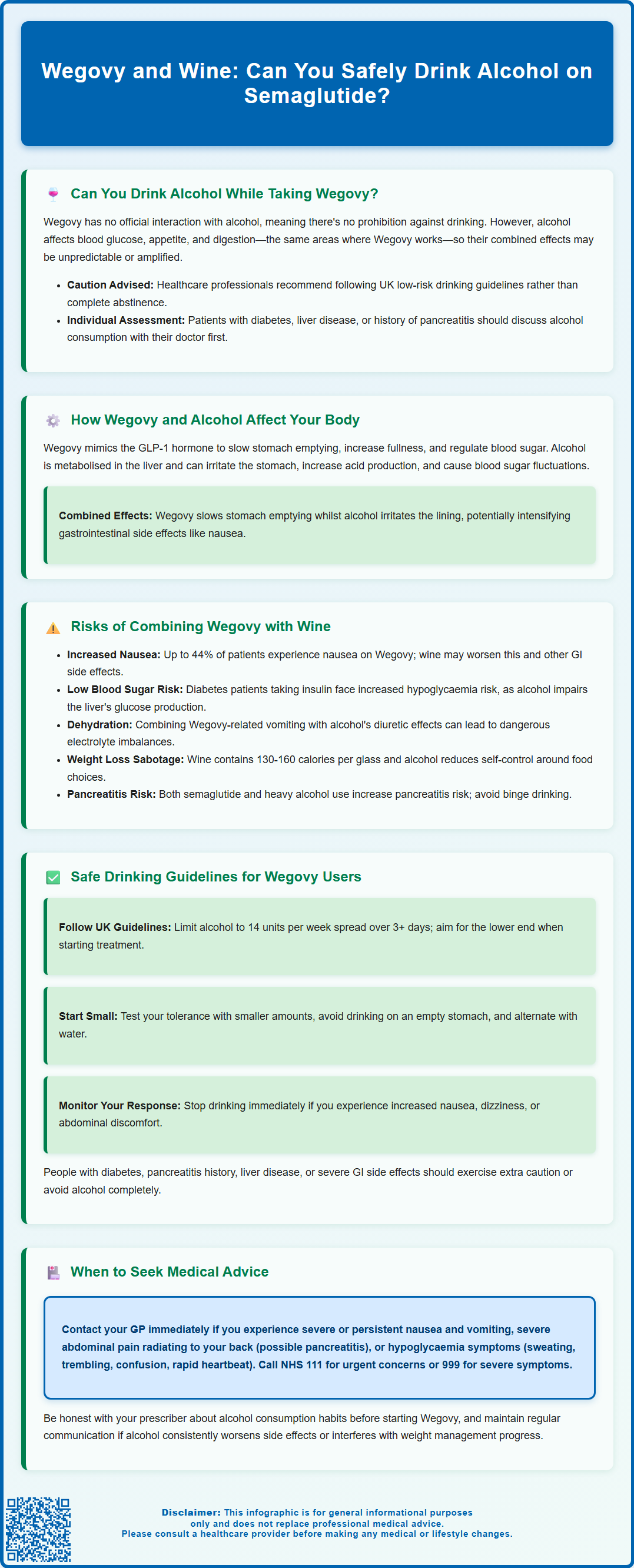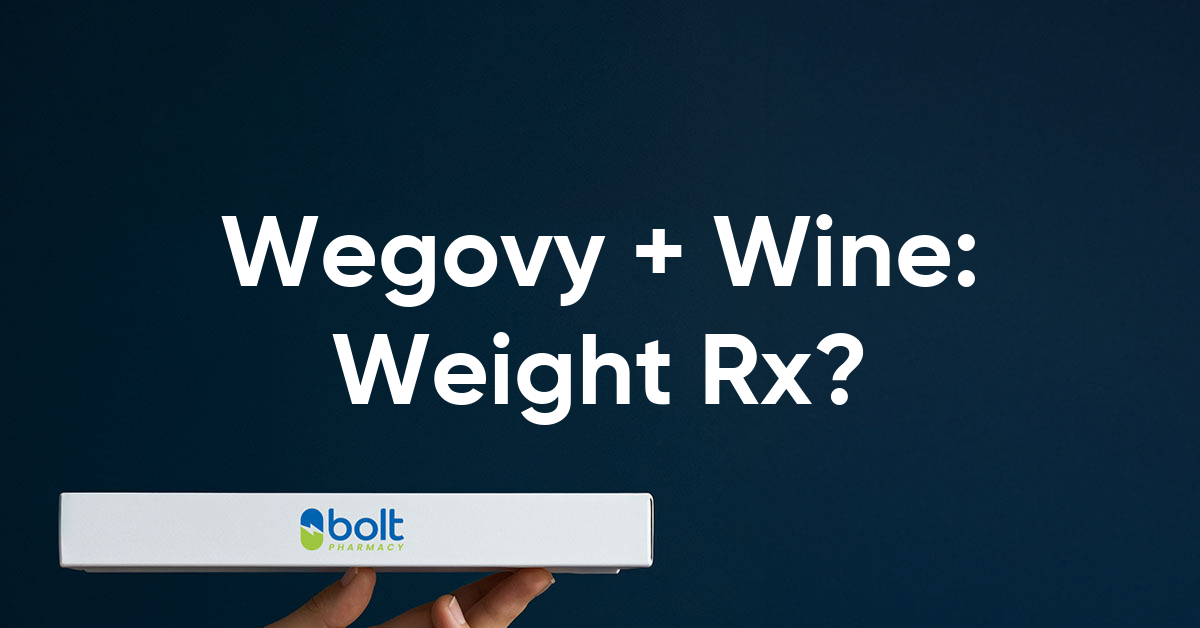Many patients prescribed Wegovy (semaglutide) for weight management wonder whether they can safely enjoy a glass of wine. Whilst there is no official prohibition against drinking alcohol whilst taking Wegovy, the combination requires careful consideration. Both substances affect gastrointestinal function and blood glucose regulation, and their combined effects may amplify side effects such as nausea or increase certain health risks. Understanding how Wegovy and wine interact in your body, following UK low-risk drinking guidelines, and discussing your individual circumstances with your GP will help you make informed, safe decisions about alcohol consumption during treatment.
Summary: Wegovy (semaglutide) has no official prohibition against alcohol consumption, but combining the two may amplify gastrointestinal side effects and requires individualised caution.
- Wegovy is a GLP-1 receptor agonist that slows gastric emptying, reduces appetite, and helps regulate blood glucose for chronic weight management.
- Alcohol can irritate the stomach lining and may worsen common Wegovy side effects including nausea, vomiting, and abdominal discomfort.
- Patients with diabetes taking insulin or sulphonylureas face increased hypoglycaemia risk when combining alcohol with semaglutide.
- UK guidance recommends no more than 14 units of alcohol weekly; Wegovy users should consider adhering to the lower end of these limits.
- Seek urgent medical attention for severe abdominal pain, persistent vomiting, signs of dehydration, or symptoms of hypoglycaemia.
- Discuss your alcohol consumption habits with your prescribing clinician for personalised advice based on your medical history and treatment response.
Table of Contents
Can You Drink Alcohol While Taking Wegovy?
Wegovy (semaglutide) does not have a listed interaction with alcohol according to the MHRA-approved Summary of Product Characteristics (SmPC). This means there is no official prohibition against drinking wine or other alcoholic beverages whilst taking this medication. However, this does not mean that combining Wegovy and alcohol is without considerations or potential risks, particularly during the initial dose titration period.
Patients prescribed Wegovy for chronic weight management should be aware that alcohol can affect blood glucose levels, appetite regulation, and gastrointestinal function — all areas where semaglutide also exerts effects. Whilst moderate alcohol consumption may be acceptable for some adults, the decision should be personalised based on your overall health status, treatment goals, and any other medical conditions you may have. Note that adolescents prescribed semaglutide should not consume alcohol.
Healthcare professionals generally advise caution rather than complete abstinence, in line with UK Chief Medical Officers' low-risk drinking guidelines. The key consideration is understanding how both substances work in your body and recognising that their combined effects may be unpredictable or amplified in certain circumstances. If you are taking Wegovy and wish to consume wine or other alcoholic drinks, it is advisable to discuss this with your GP or prescribing clinician, particularly if you have diabetes, liver disease, or a history of pancreatitis.
Patients should also consider that alcohol contains significant calories (approximately 7 kcal per gram), which may counteract the weight management goals of Wegovy treatment. Responsible, informed decision-making about alcohol consumption forms an important part of comprehensive weight management care.

How Wegovy and Alcohol Affect Your Body
Wegovy (semaglutide) is a glucagon-like peptide-1 (GLP-1) receptor agonist that works by mimicking the action of the naturally occurring GLP-1 hormone. It slows gastric emptying (the rate at which food leaves your stomach), increases feelings of fullness, reduces appetite, and helps regulate blood glucose levels by stimulating insulin secretion when blood sugar is elevated. These mechanisms contribute to reduced caloric intake and subsequent weight loss in individuals with obesity or overweight with weight-related comorbidities.
Alcohol affects multiple body systems, including the central nervous system, liver, and gastrointestinal tract. When consumed, alcohol is absorbed primarily in the small intestine, with some absorption in the stomach, then metabolised predominantly in the liver by enzymes such as alcohol dehydrogenase. Alcohol can cause gastric irritation, increase acid production, and in some individuals, trigger nausea or vomiting. It also affects blood glucose regulation — the glycaemic response depends on the carbohydrate content of the drink and whether you've consumed food, with potential for hypoglycaemia (low blood sugar) several hours after consumption, particularly in those taking diabetes medications.
The interaction between Wegovy and alcohol centres on overlapping effects on the gastrointestinal system. Since Wegovy already slows gastric emptying, adding alcohol — which can irritate the stomach lining and cause nausea — may intensify gastrointestinal side effects. Additionally, both substances influence blood glucose homeostasis, though through different mechanisms. No clinically significant pharmacokinetic interaction is reported in the SmPC; however, semaglutide's delayed gastric emptying may influence the timing of alcohol absorption, and the combined physiological effects warrant careful consideration, particularly regarding tolerability and symptom management.
Risks of Combining Wegovy with Wine
The primary risks of combining Wegovy with wine relate to amplified gastrointestinal side effects. Common adverse reactions to Wegovy include nausea (reported in up to 44% of patients during clinical trials according to the MHRA SmPC), vomiting, diarrhoea, constipation, and abdominal discomfort. Alcohol consumption, particularly wine, can exacerbate these symptoms by irritating the gastric mucosa and increasing acid secretion. Patients who already experience nausea with Wegovy may find that even moderate wine consumption significantly worsens their symptoms, potentially affecting treatment adherence and quality of life.
Hypoglycaemia risk, whilst generally low with Wegovy monotherapy, may be relevant for certain patients. Individuals with type 2 diabetes taking Wegovy alongside insulin or insulin secretagogues (such as sulphonylureas) face increased hypoglycaemia risk. Alcohol can impair the liver's ability to produce glucose through gluconeogenesis, potentially prolonging or intensifying hypoglycaemic episodes. Symptoms of hypoglycaemia — including dizziness, confusion, and sweating — may be mistaken for intoxication, delaying appropriate treatment.
Dehydration and electrolyte imbalance represent another consideration. If Wegovy causes vomiting or diarrhoea, and alcohol consumption (which has diuretic properties) compounds fluid loss, patients may become dehydrated. In severe cases, this could precipitate acute kidney injury in susceptible individuals. This is particularly concerning for older adults or those with kidney disease. Additionally, alcohol's caloric content may undermine weight loss efforts — a standard 175ml glass of wine contains approximately 130–160 calories, and alcohol can lower inhibitions around food choices, potentially leading to increased caloric intake.
Evidence on moderate alcohol consumption with semaglutide is limited. Both semaglutide and excessive alcohol use are independently associated with pancreatitis risk, and heavy or binge drinking should be avoided. Patients should remain vigilant for symptoms such as severe, persistent abdominal pain radiating to the back, which requires urgent medical assessment.
Safe Drinking Guidelines for Wegovy Users
The UK Chief Medical Officers recommend that adults should not regularly drink more than 14 units of alcohol per week, spread over three or more days, with several alcohol-free days each week. One unit equals 10ml (8g) of pure alcohol — a standard 175ml glass of wine (12% ABV) contains approximately 2.1 units. These guidelines apply to the general adult population, and individuals taking Wegovy should consider adhering to the lower end of these recommendations, particularly during the initial titration phase when side effects are most pronounced. Heavy or binge drinking should be avoided, especially during dose escalation.
Practical strategies for safer alcohol consumption whilst taking Wegovy include:
-
Start with small amounts — assess your individual tolerance by consuming less than you normally would, particularly when first combining alcohol with Wegovy
-
Avoid drinking on an empty stomach — having food in your system may help mitigate gastrointestinal discomfort
-
Stay well hydrated — alternate alcoholic drinks with water to reduce dehydration risk and help manage potential nausea
-
Monitor your symptoms — pay attention to how your body responds and be prepared to stop drinking if you experience increased nausea, dizziness, or abdominal discomfort
-
Consider timing — some patients find through personal experience that avoiding alcohol on the day of their weekly Wegovy injection may help manage side effects, though this is not evidence-based guidance
Certain patient groups should exercise particular caution or avoid alcohol entirely. This includes individuals with diabetes (especially those on insulin or sulphonylureas), those with a history of pancreatitis, patients with liver disease, and anyone who has experienced severe gastrointestinal side effects with Wegovy. Your prescribing clinician can provide personalised advice based on your medical history, concurrent medications, and treatment response. Remember that weight management is most effective when combined with lifestyle modifications, and reducing alcohol intake often supports both health and weight loss goals.
When to Seek Medical Advice About Alcohol and Wegovy
You should contact your GP or prescribing clinician promptly if you experience concerning symptoms after combining Wegovy with wine or other alcoholic beverages. Severe or persistent nausea and vomiting that prevents you from keeping down fluids or medications requires medical assessment, as this may lead to dehydration and electrolyte disturbances. Similarly, if you develop severe abdominal pain, particularly if it radiates to your back, seek urgent medical attention, as this could indicate pancreatitis — a rare but serious potential adverse effect of GLP-1 receptor agonists.
For urgent concerns, contact NHS 111; call 999 or attend A&E for severe symptoms such as severe abdominal pain with systemic illness, severe dehydration, or altered consciousness.
Signs of hypoglycaemia warrant immediate action, especially if you have diabetes. Symptoms include excessive sweating, trembling, confusion, rapid heartbeat, blurred vision, and feeling unusually hungry or irritable. If you suspect low blood sugar, check your glucose level if possible, consume fast-acting carbohydrates (such as glucose tablets or fruit juice), and contact your healthcare team if episodes are recurrent or severe. Never assume symptoms are simply due to alcohol intoxication if you are taking medications that affect blood glucose.
Before starting Wegovy, inform your prescriber about your alcohol consumption habits. Honest disclosure allows for appropriate risk assessment and tailored advice. If you find yourself drinking more than the recommended guidelines, or if you have concerns about alcohol dependence, your GP can provide support and referral to specialist services if needed. The NHS offers various alcohol support services, and addressing problematic drinking is an important component of overall health optimisation.
Regular monitoring and open communication with your healthcare team are essential throughout Wegovy treatment. If you notice that alcohol consistently worsens your side effects, affects your ability to adhere to treatment, or undermines your weight management progress, discuss these concerns at your follow-up appointments. Your treatment plan should be flexible and responsive to your individual circumstances, and adjustments can be made to optimise both safety and effectiveness.
If you experience any suspected side effects from Wegovy, with or without alcohol consumption, report them through the MHRA Yellow Card scheme. Remember that successful weight management involves a holistic approach, and your clinical team is there to support you in making informed decisions about all aspects of your lifestyle, including alcohol consumption.
Frequently Asked Questions
Is it safe to drink wine whilst taking Wegovy?
There is no official prohibition against drinking wine whilst taking Wegovy, but caution is advised as both substances affect gastrointestinal function and may amplify side effects such as nausea. Discuss your individual circumstances with your GP or prescribing clinician.
Can alcohol affect Wegovy's effectiveness for weight loss?
Alcohol contains significant calories (approximately 7 kcal per gram) and may lower inhibitions around food choices, potentially undermining the weight management goals of Wegovy treatment. Reducing alcohol intake often supports both health and weight loss objectives.
What are the main risks of combining Wegovy with alcohol?
The primary risks include amplified gastrointestinal side effects (nausea, vomiting), potential hypoglycaemia in patients with diabetes taking certain medications, dehydration from combined fluid loss, and interference with weight management goals due to alcohol's caloric content.
The health-related content published on this site is based on credible scientific sources and is periodically reviewed to ensure accuracy and relevance. Although we aim to reflect the most current medical knowledge, the material is meant for general education and awareness only.
The information on this site is not a substitute for professional medical advice. For any health concerns, please speak with a qualified medical professional. By using this information, you acknowledge responsibility for any decisions made and understand we are not liable for any consequences that may result.
Heading 1
Heading 2
Heading 3
Heading 4
Heading 5
Heading 6
Lorem ipsum dolor sit amet, consectetur adipiscing elit, sed do eiusmod tempor incididunt ut labore et dolore magna aliqua. Ut enim ad minim veniam, quis nostrud exercitation ullamco laboris nisi ut aliquip ex ea commodo consequat. Duis aute irure dolor in reprehenderit in voluptate velit esse cillum dolore eu fugiat nulla pariatur.
Block quote
Ordered list
- Item 1
- Item 2
- Item 3
Unordered list
- Item A
- Item B
- Item C
Bold text
Emphasis
Superscript
Subscript












